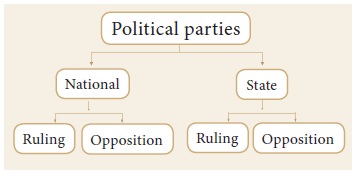Meaning, Types, Role - Political Parties | 9th Social Science : Civics : Election, Political Parties and Pressure Groups
Chapter: 9th Social Science : Civics : Election, Political Parties and Pressure Groups
Political Parties
Political
Parties
Political parties are an essential part of
democracy. Parties are the link between government and the people.
1. Meaning of Political Party
A political party is an organisation formed by a
group of people with a certain ideology and agenda to contest elections and
hold power in the government. A political party has three components: a leader,
active members and the followers.
2. Types of a Party System
There are three types of party system in the world
namely.
i.
Single-party system in which one ruling party
exists and no opposition is permitted. China, Cuba, the former USSR (Union of
Soviet Socialist Republics) are the examples for the single-party system.
ii.
Two-party system in which only two major parties
exist, for example, USA, UK.
iii.
Multi-party system in which there are more than two
political parties, for example, India, Sri Lanka, France and Italy.
3. Types of Political Parties
Political parties in India are classified according
to their area of influence into two main types:(1) national and (2) state
parties.

3.1 National Parties
A party which is recognised as a state party in at
least four states is recognised as a national party. Every party in the country
has to register with the Election Commission while the Commission treats all
the parties equally. It offers some special facilities to state and national
parties. These parties are given a unique symbol. Only the official candidate
of the party can use that election symbol. In 2017, there were seven recognised
national parties.
3.2 State Parties
Other than the seven national parties, most of the
major parties of the country are classified by the Election Commission as
ãstate partiesã. These are commonly referred to as regional parties. A party is
recognised as a state party by the Election Commission of India based on
certain percentage of votes secured or a certain number of seats won in the
Assembly or Lok Sabha elections.
3.3 Recognition to the Parties
For getting recognition as ãnational partyã, a
party has to fulfill any one of the following criteria:
i.
At least 6% votes in at least four states and
members to the Lok Sabha.
ii.
In the election of Lok Sabha, at least 2% members
from at least three states are elected to Lok Sabha.
iii.
Recognition as a state party at least four states.
3.4 Functions of Political Parties
ôñ
Parties contest elections. In most democracies, elections are fought mainly among the candidates put
up by political parties.
ôñ
Parties put forward their policies and programmes before the electorate to consider and choose.
ôñ
Parties play a decisive role in making laws for a country. Formally, laws are debated and passed in the
legislature.
ôñ
Parties form and run the governments.
ôñ
Those parties that lose in the
elections play the role of the Opposition to the party or a group of
coalition parties in power, by voicing different views and
criticising the government for its failures or wrong policies.
ôñ
Parties shape public opinion. They
raise and highlight issues of importance.
ôñ
Parties function as the useful link
between people and the government machinery.
4. Role of Opposition Parties in a Democracy
In a democracy, there may be a two-party system
like in the USA or a multi-party system like in India and France. The ruling
party may have received the mandate of the majority people and the Opposition
party represented the remaining people. The Leader of the Opposition party
occupied a prominent place in all democratic forms of the government. He enjoys
the rank of a Cabinet Minister. He opposes the wrong policies of the ruling
party, which affects the general public. As the Chairman of the Public Accounts
Committee questions the functioning of the government departments and examines
the public money used for the well -being of the people. Similarly, he plays an
important role to select the Chairman and members of the Central Vigilance
Commission, Chairperson and members of the Information Commission. The
Opposition Parties reflect genuine demands and concern of the people to play a
constructive role in a democracy.
Related Topics